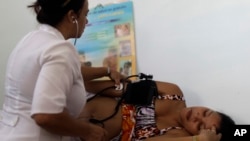High blood pressure is no longer just a serious health concern in Western countries, it affects every part of society, rich and poor, urban and rural, according to a new study from the World Health Organization.
High blood pressure or hypertension causes heart attack, stroke and kidney failure. Last year, experts say, hypertension was responsible for 45 percent of the deaths due to heart disease and 51 percent of stroke deaths worldwide.
The WHO’s Study on Aging and Adult Health collected blood pressure information from more than 35,000 people in six middle- and low-income countries; South Africa, China, Ghana, India, Mexico and Russia.
South Africa had the highest rate of hypertension: 78 percent of adults age 50 and older. Only one in 10 got adequate treatment for the condition.
The SAGE investigators found high blood pressure in almost 72 percent of the adults they surveyed in the Russian Federation. Hypertension was lower, but still high, in the other countries; 58 percent in Mexico, 57 percent in Ghana, 53 percent in China, and 32 percent in India. More women than men had high blood pressure, according to the survey.
High blood pressure is becoming as common in developing countries as it is in the West., says Shah Ebrahim, from the London School of Hygiene and Tropical Medicine.
“And that has been a trend we have been aware of for probably 30 or 40 years, but there has been very little real data to actually examine it exclusively, objectively what is going on," he said.
Ebrahim attributes the increase in hypertension in the developing world mostly to a diet high in salt, obesity and alcohol consumption by men.
Ebrahim says the majority of people in the sampled countries were largely undiagnosed and untreated. Without medical intervention, he says the cost of high blood pressure can be devastating to families. And drugs for controlling the condition do not have to be costly.
“The most expensive drugs are widely available in poorer countries," he said. "And again, often the health system with private practitioners tend to promote very expensive drugs when much cheaper drugs would do the trick just as well.”
The study, funded by the the U.S. National Institute on Aging, was published in the International Journal of Epidemiology. An accompanying editorial compared the global scope of hypertension to that of HIV, saying both are deadly but easy to diagnose and treat.
High blood pressure or hypertension causes heart attack, stroke and kidney failure. Last year, experts say, hypertension was responsible for 45 percent of the deaths due to heart disease and 51 percent of stroke deaths worldwide.
The WHO’s Study on Aging and Adult Health collected blood pressure information from more than 35,000 people in six middle- and low-income countries; South Africa, China, Ghana, India, Mexico and Russia.
South Africa had the highest rate of hypertension: 78 percent of adults age 50 and older. Only one in 10 got adequate treatment for the condition.
The SAGE investigators found high blood pressure in almost 72 percent of the adults they surveyed in the Russian Federation. Hypertension was lower, but still high, in the other countries; 58 percent in Mexico, 57 percent in Ghana, 53 percent in China, and 32 percent in India. More women than men had high blood pressure, according to the survey.
High blood pressure is becoming as common in developing countries as it is in the West., says Shah Ebrahim, from the London School of Hygiene and Tropical Medicine.
“And that has been a trend we have been aware of for probably 30 or 40 years, but there has been very little real data to actually examine it exclusively, objectively what is going on," he said.
Ebrahim attributes the increase in hypertension in the developing world mostly to a diet high in salt, obesity and alcohol consumption by men.
Ebrahim says the majority of people in the sampled countries were largely undiagnosed and untreated. Without medical intervention, he says the cost of high blood pressure can be devastating to families. And drugs for controlling the condition do not have to be costly.
“The most expensive drugs are widely available in poorer countries," he said. "And again, often the health system with private practitioners tend to promote very expensive drugs when much cheaper drugs would do the trick just as well.”
The study, funded by the the U.S. National Institute on Aging, was published in the International Journal of Epidemiology. An accompanying editorial compared the global scope of hypertension to that of HIV, saying both are deadly but easy to diagnose and treat.




